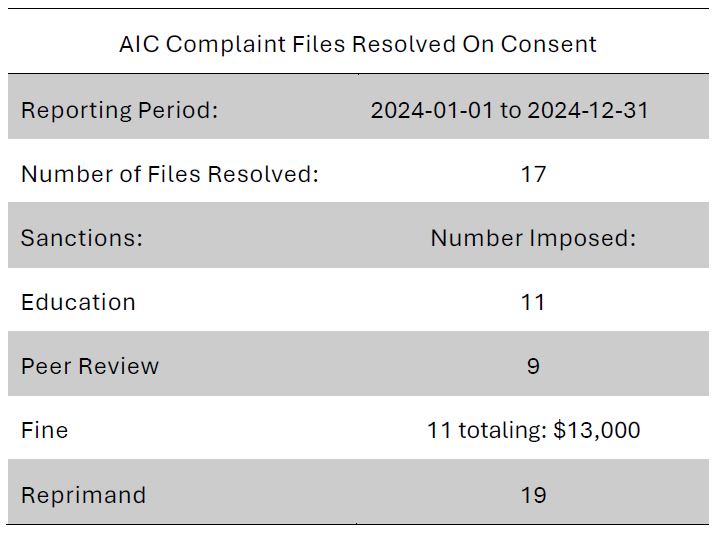Répondre à vos préoccupations
Le processus de révision des pratiques professionnelles de l’ICE
Le Processus de résolution des plaintes de l’ICE veut maintenir l’excellence de la profession d’évaluateur et des services que les membres de l’ICE rendent au public. Une plainte doit être déposée par écrit en remplissant le Formulaire de plainte inclus dans le processus de révision des pratiques professionnelles de l’ICE. L’enquête de l’ICE sur une plainte porte sur la conformité aux Normes uniformes de pratique professionnelle en matière d’évaluation au Canada (NUPPEC).
Le PEPP de l’ICE ne peut pas :
- donner suite à une plainte contre une société ou une entreprise
- donner suite à une plainte contre une personne qui n’est pas membre de l’ICE
- donner suite à une plainte anonyme
- examiner un rapport pour vérifier sa conformité aux NUPPEC en dehors du PEPP
- effectuer des examens techniques d’évaluation conformément à la Norme relative aux activités d’examen des NUPPEC
- toute personne souhaitant obtenir des rapports d’examen technique d’évaluation peut faire appel à un évaluateur examinateur pour effectuer ce type de contrat de service.
- pour trouver un évaluateur examinateur dans votre région, veuillez utiliser le moteur de recherche « Besoin d’un évaluateur professionnel » sur le site web de l’ICE
- fournir une opinion sur l’opinion finale sur la valeur
- toute personne qui souhaite obtenir une opinion sur l’estimation finale de la valeur dans un rapport peut faire appel à un évaluateur examinateur pour effectuer un examen technique de l’évaluation
- pour trouver un évaluateur examinateur dans votre région, veuillez utiliser le moteur de recherche « Besoin d’un évaluateur professionnel » sur le site web de l’ICE
- accorder une compensation financière pour dommages
- toute personne souhaitant obtenir une compensation ou une indemnisation pour une perte financière peut consulter un avocat local
- examiner les honoraires et les dépenses d’un membre
- toute personne souhaitant obtenir un examen des honoraires ou des dépenses peut consulter le Better Business Bureau local ou un avocat local
- ordonner le remboursement d’une somme d’argent ou des honoraires
- toute personne souhaitant obtenir un remboursement peut consulter le Better Business Bureau local ou un avocat local.
- faire respecter des accords contractuels
- toute personne souhaitant faire respecter un accord contractuel peut consulter un avocat local
- agir en tant que tribunal
- toute personne souhaitant obtenir une ordonnance ou une décision de justice peut consulter un avocat local.
- donner des conseils juridiques
- toute personne souhaitant obtenir des conseils juridiques peut consulter un avocat local
- coïncider avec ou être complémentaire à toute question ne relevant pas du processus de l’ICE
- toute personne souhaitant étayer sa position dans une affaire faisant l’objet d’un autre processus (par ex. : médiation, litige, négociation, financement, etc.) peut faire appel à un évaluateur examinateur pour produire un rapport technique d’examen d’évaluation
- pour trouver un évaluateur examinateur dans votre région, veuillez utiliser le moteur de recherche « Besoin d’un évaluateur professionnel » sur le site web de l’ICE.
- comparer deux rapports et donner une opinion sur lequel est le « meilleur »
- (veuillez consulter la section sur les examens techniques d’évaluation au point 5)
- réaliser un nouveau rapport
- toute personne souhaitant obtenir un nouveau rapport peut faire appel à un évaluateur local
- pour trouver un évaluateur dans votre région, veuillez utiliser le moteur de recherche « Besoin d’un évaluateur professionnel » sur le site web de l’ICE.
obliger un membre à refaire un rapport ou à préparer un nouveau rapport
La durée d’un examen de la pratique professionnelle de l’ICE dépendra de la nature et de la complexité des questions soulevées.
L’identité du plaignant sera communiquée au membre.
Le plaignant recevra une copie de la décision finale du panel d’arbitrage ou d’appel.
Si le dossier d’examen de la pratique professionnelle est clos sans qu’aucune violation des NUPPEC n’ait été constatée et qu’aucune sanction n’est imposée en rapport avec le fond de la plainte, le plaignant sera informé de la clôture du dossier. Pour des raisons de confidentialité, la quantité d’informations relatives à cette résolution peut être limitée.
Si un plaignant retire sa plainte, il ne recevra aucune information sur la résolution du dossier d’examen de la pratique professionnelle.
La résolution d’un dossier d’examen de la pratique professionnelle ne peut pas faire l’objet d’un appel de la part du plaignant.
Afin de protéger l’intégrité d’une enquête, on ne peut fournir qu’une information limitée sur ses progrès.
De plus amples renseignements sur le processus de révision de la pratique professionnelle de l’ICE se trouvent dans le processus de révision des pratiques professionnelles de l’ICE.
Soumission d’un formulaire de plainte
Toute personne souhaitant soumettre un formulaire de plainte peut accéder au formulaire en ligne ici.
Résumé des révisions complétées des pratiques professionnelles
L’objectif de l’ICE est de fournir autant de directives que possible sur le processus de révision des pratiques professionnelles. Dans cette optique, les études de cas suivantes présentent des dossiers de plainte complétés.
Remarque : Toutes les mesures ont été prises pour protéger l’identité des personnes dans ces résumés. Toutefois, dans certains dossiers, une instance décisionnelle en matière de pratiques professionnelles a ordonné la publication; dans ce cas, le nom du membre a été divulgué.

Dossiers 2024




